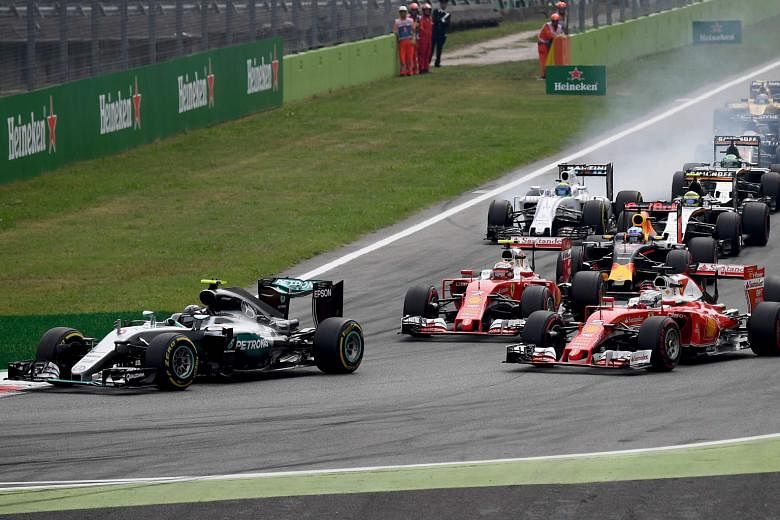You must have heard racing drivers say it so many times that it has become a cliche: They don't give points on a Saturday.
Nevertheless, qualifying is pretty important these days - and oddly, the wide-open Monza places an even greater premium on pole position than does the tightly packed Monaco.
Yet, as Lewis Hamilton, Max Verstappen and Esteban Gutierrez illustrated so harshly on Sunday afternoon on the royal park, it doesn't matter how far up the grid you start if you don't get off the start line efficiently.
That is what really matters on Sunday afternoon.
Nico Rosberg did it to perfection, and he won the race. Alongside him at the start, Hamilton lagged alarmingly and was immediately sandbagged by Rosberg, Sebastian Vettel and Kimi Raikkonen in their Ferraris, Valtteri Bottas' Williams and Daniel Ricciardo's Red Bull.
 Mercedes' Nico Rosberg taking the lead ahead of both Ferraris after pole-sitter Lewis Hamilton had suffered yet another disappointing start in the opening seconds of the Italian Grand Prix on Sunday. PHOTO: AGENCE FRANCE-PRESSE
Mercedes' Nico Rosberg taking the lead ahead of both Ferraris after pole-sitter Lewis Hamilton had suffered yet another disappointing start in the opening seconds of the Italian Grand Prix on Sunday. PHOTO: AGENCE FRANCE-PRESSE As Rosberg raced away to his seventh win of the season, and to close back to within two points of his team-mate who had been 19 points ahead after the summer break, Hamilton was doomed to finish a distant second.
So what was it that went wrong in these moments? Was it driver error, or mechanical misfortune, and why is it so often that Mercedes are the ones who suffer?
To begin with, Hamilton believed the error was his, even though he had gone through all the usual protocols and done absolutely nothing different than usual.
It was not until the post-race debrief that his engineers told him that the clutch itself was to blame. He said that Mercedes continue to have an inconsistency in the system.
"You've seen it with Nico in Hockenheim. And it's bitten me quite a lot this year," the Briton said. "I was told the procedure was done exactly how I was supposed to do it, but unfortunately we just sometimes over-deliver the torque, and the wheels were just spinning from the get-go."
This, despite the team working really hard to alleviate the problem, last year and this.
Team boss Toto Wolff has in the past called in engineers in Mercedes' main factory to help solve the problem, but Formula One cars are so complex that there is no overnight fix. When the drivers do practice starts over a race weekend, the results can be worryingly inconsistent.
The idea that a world championship could be won or lost on such vagaries is deeply worrying, not just to the team and the drivers and the car manufacturer, but to their fans.
"It's something that we need to work on," Hamilton said, with commendable restraint.
"I can assure you on Tuesday in the factory that's the only thing we'll be talking about, because we're doing everything else really well."
By then, it's possible that something rather more momentous in terms of the sport's future than an uncharacteristically dull race on Sunday might have taken place.
Formula One officials are expected to gather to sign off a deal to sell a significant share of the sport to US cable television entrepreneur John Malone's Liberty Media.
Such a move could have a massive effect on the manner in which Formula One is administered and marketed throughout the world. It comes at a time when audiences have been shrinking, and so the prospect of change is eagerly anticipated by many of the teams who have accused the present owners of failing to engage with fans.
Although there are suggestions that Liberty's owner Malone may want other people in charge of the sport, Bernie Ecclestone has insisted that its future remains in his hands.
It is believed that in any deal, Ecclestone, the ringmaster of the sport since he revolutionised its financial structures in the 1970s and made all the team owners very wealthy, would name his own role within the revised structure of the sport.
He insisted: "I will do what I have always done. What role I play is my decision."


